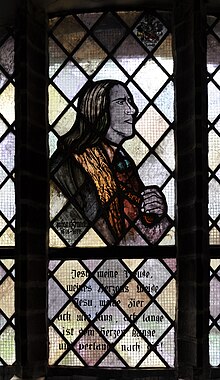Johann Fran(c)k (1 June 1618 – 18 June 1677) was a German politician (serving as mayor of Guben and a member of the Landtag of Lower Lusatia) and a lyric poet and hymnist.

Life
Franck was born in Guben, Margraviate of Lower Lusatia. After visiting the Latin school in Guben, he attended schools in Cottbus and Stettin, as well as the gymnasium in Thorn (Toruń). After studying law at the University of Königsberg, he became a councilor in his native town, later becoming its mayor and a member of the Landtag of Lower Lusatia. He died in Guben.
Works
Under the influence of the Silesian School and of Simon Dach of Königsberg, he produced a series of poems and hymns, collected and edited by himself in two volumes (Guben, 1674), entitled: Teutsche Gedichte, enthaltend geistliches Zion samt Vaterunserharfe nebst irdischem Helicon oder Lob-, Lieb-, Leidgedichte, etc.. His secular poems are forgotten; about forty of his religious songs, hymns, and psalms have been kept in the hymals of the German Protestant Church. Some of these are the hymn for Communion "Schmücke dich, o liebe Seele" ("Deck thyself, my soul, with gladness"), the Advent hymn Komm, Heidenheiland, Lösegeld (Come, Ransom of our captive race, a translation into German of Veni redemptor gentium), and a hymn to Jesus, "Jesu, meine Freude" ('Jesus, My Joy'), which is best known as being the basis of Bach's funeral motet Jesu, meine Freude, BWV 227. His hymn "Du, o schönes Weltgebäude" (You, o beautiful building of the world), with a melody by Crüger is no longer in practical use, but one stanza, "Komm, o Tod, du Schlafes Bruder" (Come, O death, to sleep a brother), was prominently used in Bach's solo cantata Ich will den Kreuzstab gerne tragen, BWV 56.
The music for his hymns by the Guben organist Christoph Peter appeared first in the Andachtscymbeln, the oldest Guben hymn book, in 1648. In honor of Franck, a simple monument has been erected at the south wall of the Guben parish church.
References
- "Kultur in der Kirche". Kulturkirchen. Retrieved 9 May 2022.
- "MGG Online". MGG Online (in German). 6 May 2022. Retrieved 9 May 2022.
- ^ Werner, A. "Philip Schaff: Schaff-Herzog Encyclopedia Vol. : 0381=365 – Christian Classics Ethereal Library". Home – Christian Classics Ethereal Library. Retrieved 9 May 2022.
- "Johann Franck (Frank)". Biografie WHO'S WHO (in German). Retrieved 9 May 2022.
- "Ich will den Kreuzstab gerne tragen". Schönborn (Rhein-Lahn-Kreis), Kirche (in German). Retrieved 9 May 2022.
- "Text". Bachkantaten in der Predigerkirche (in German). Retrieved 9 May 2022.
Sources
 This article incorporates text from a publication in the public domain: Jackson, Samuel Macauley, ed. (1914). "Johann Franck (Frank)". New Schaff–Herzog Encyclopedia of Religious Knowledge (third ed.). London and New York: Funk and Wagnalls.
This article incorporates text from a publication in the public domain: Jackson, Samuel Macauley, ed. (1914). "Johann Franck (Frank)". New Schaff–Herzog Encyclopedia of Religious Knowledge (third ed.). London and New York: Funk and Wagnalls.- Jentsch, Hugo (1877), "Franck, Johann (Dichter)", Allgemeine Deutsche Biographie (in German), vol. 7, Leipzig: Duncker & Humblot, pp. 211–212
- Lorenzen, Käte (1961), "Franck (Frank), Johann", Neue Deutsche Biographie (in German), vol. 5, Berlin: Duncker & Humblot, pp. 317–317; (full text online)
- Marshall, Traute Maass (2001). "Franck , Johann". Oxford Music Online. Oxford University Press. doi:10.1093/gmo/9781561592630.article.10123.
Further reading
- Storz, Pastor Harald (18 November 2008). "Predigt über "Jesu, meine Freude"". Der Predigtpreis (in German). Retrieved 9 May 2022.
- Rundschau, Lausitzer (18 May 2018). "Erinnerung: Gedenktafel für Johann Franck geplant". lr-online.de (in German). Retrieved 9 May 2022.
External links
- Johann Franck bach-cantatas.com
- "Composers and Poets". Deutsches Lied (in German). Retrieved 9 May 2022.